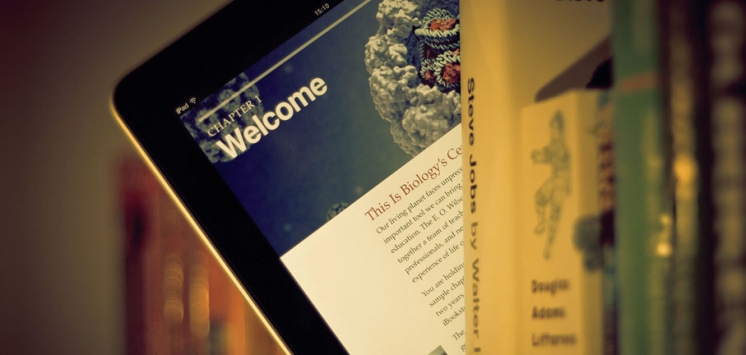The Future Writing Space
In the first 2 chapters of Writing Space: Computers, Hypertext, and the Remediation of Print, Bolter (2000) shares how the idea of ‘the book’ is changing due to consumers requirements regarding print and digital formats. He argues that books no longer offer what the modern reader wants; flexibility, interactivity, and speed. “Electronic technology provides a range of new possibilities, whereas the possibilities of print seem to have been played out” (Bolter, 2000, p.2).
Much of what Bolter (2002) refers to as the future of writing is already taking place. He refers to educators using interactive virtual worlds and games effectively replacing print as the medium in which learning environments are being created. Gamification is already taking off and capturing the interest of educators and learners. Bolter (2002) also referred to how electronic technology continues to evolve, and more and more people are turning to publishing their work digitally. Books are no longer the preferred portable devices. Smart phones and tablets are not only portable, but allow us to access new books and information 24/7, cheaper and faster! Fifteen years ago Bolger (2002, p.3) asked, “Will digital media replace print?” I believe so, but perhaps not at the pace we expect. Some of us still prefer to hold printed text in our hands.
New technology is reshaping the visual and conceptual space of writing. The writing space “is generated by the interaction of material properties and cultural choices and practices” (Bolter, 2000, p.12). Although technology may influence and reshape the writing space, writing itself still requires our physical and mental interactions. We are simply using the affordances that digital technology provides to change the relationship between the act of writing and the ideal of writing. The act of writing has been influenced by the technologies of the past. We don’t simply abandon what we have learned from these technologies, but we restructure our literary culture by using the new tools to transform how we interact with text. The computer, and now portable devices, imitate, adapt and improve upon the technologies of the past. Bolger (2002) argues that electronic writing may influence the whole economy of writing, especially the change from printed book to digital text. And, to his credit, 15 years into the future, it certainly has.
Bolter, J. D. (2000). Writing Space: Computers, Hypertext, and the Remediation of Print. Mahwah, NJ: Lawrence Erlbaum Associates.
Larsson, J. (photographer). (2012, March 9). The Future of Books [digital image]. Retrieved from https://www.flickr.com/photos/johanl/6966883093


Technology is opening doors to authors. Now an eBook can be published without the need of a middleman. Teachers are authoring their own eBooks using software such as iBook author. They can make money, get reader feedback, add media, and update their eBooks anytime with zero cost. A book became a continuum of thought.
I think you made some good points Corinne,
I was intrigued when I read this comment, “Electronic technology provides a range of new possibilities, whereas the possibilities of print seem to have been played out” (Bolter, 2000, p.2). Writing technologies have changed so rapidly that Bolter must have been required to change much from the original edition. Whether it is the Gamification or handheld revolution you mentioned, change is certainly here. Interestingly enough, I wonder if we should include how reading technologies are changing. Specifically I’m not thinking about the medium used, but how the text is presented on the medium. This reminded me of an article I read on Wired Magazine. The article explained how a new program claims to help you read much faster, and with greater comprehension, without skipping words (Gaudiano, 2014).
As I found on Spritz’s website: Traditional reading involves publishing text in lines and moving your eyes sequentially from word to word (Spitz, 2015). As Bolter mentioned, to read is to follow one path from among those suggested by the layout of the text. Spritz is taking advantage of this fact.
As they continue to explain, for each word, the eye seeks a certain point within the word, which we call the “Optimal Recognition Point” or ORP. After your eyes find the ORP, your brain starts to process the meaning of the word that you’re viewing. With each new word, your eyes move, called a “saccade”, and then your eyes seek out the ORP for that word. Once the ORP is found, processing the word for meaning and context occurs and your eyes move to the next word. When your eyes encounter punctuation within and between sentences, your brain is prompted to assemble all of the words that you have read and processes them into a coherent thought (Spritz, 2015).
What would Bolter think of this? I believe that he mentioned hypermedia forces the author and reader to carefully negotiate reading paths.
Initial public response has shown that people have mixed reactions. Some are excited but others are hesitant to embrace the new (supposedly) scientifically based technology. With fears as Bolter mentioned, people wonder if words are no longer able to carry conviction without the reappearance as a picture of the imagery that was latent in them (Bolter, 2000, p. 54). When someone considers at technology like Spritz it will be interesting to see how it turns out. Will this make us completely reliant on computers? Who knows, but it’s pretty exciting!
You can try it here: http://www.spritzinc.com/test/#/
Bolter, J. D. (2000). Writing Space: Computers, Hypertext, and the Remediation of Print. Mahwah, NJ: Lawrence Erlbaum Associates.
Gaudiano, P. (2014) As It Turns Out, a Picture Is Not Worth a Thousand Words | WIRED. Retrieved from http://www.wired.com/2014/03/turns-picture-worth-thousand-words/
Spritz. (2015). The Science. Retrieved from http://www.spritzinc.com/the-science/